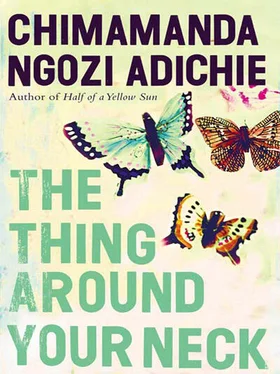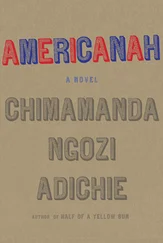The next day, Nnamabia barely touched his rice. He said that the policemen had splashed detergent water on the floor and walls of the cell in the name of cleaning as they usually did and that the old man, who could not afford water, who had not bathed in a week, had hurried into the cell and yanked his shirt off and rubbed his frail back against the detergent-wet floor. The policemen started to laugh when they saw him do this and they asked him to take all his clothes off and parade in the corridor outside the cell, and as he did they laughed louder and asked whether his son the thief knew that papa’s penis was so shriveled. Nnamabia was staring at his yellow-orange rice as he spoke, and when he looked up I saw my brother’s eyes fill with tears — my worldly brother — and I felt a tenderness for him that I could not have explained had I been asked to.
* * *
Two days later, there was another cult attack on campus: a boy hacked another boy with an axe right in front of the music department building.
“This is good,” my mother said as she and my father got ready to go and see the Nsukka police superintendent again. “They cannot say now that they have arrested all the cult boys.” We did not go to Enugu that day, because my parents spent so long at the superintendent’s, but they came back with good news. Nnamabia and the barman were to be released immediately. One of the cult boys had become an informer, and he insisted that Nnamabia was not a member. We left earlier than usual in the morning, without jollof rice, the sun already so hot that all the car windows were down. My mother was jumpy on the drive. She was used to saying “ Nekwa ya! Watch out!” to my father as if he could not see the cars making dangerous turns in the other lane, but this time she did it so often that just before we got to Ninth Mile, where hawkers crowded around the car with their trays of okpa and boiled eggs and cashew nuts, my father stopped the car and snapped, “Just who is driving this car, Uzoamaka?”
Inside the sprawling station compound, two policemen were flogging somebody who was lying on the ground under the umbrella tree. At first I thought, with a lurch in my chest, that it was Nnamabia, but it was not. I knew the boy who lay on the ground, writhing and shouting with each lash of a policeman’s koboko . He was called Aboy, and he had the grave, ugly face of a hound and drove a Lexus on campus and was said to be a Buccaneer. I tried not to look at him as we walked into the station. The policeman on duty, the one with tribal marks on his cheeks who always said “God bless you” when he took his bribe, looked away when he saw us. Prickly hives spread over my skin. I knew then that something was wrong. My parents gave him the note from the superintendent. The policeman did not look at it. He knew about the release order, he told my father, the bar man had already been released but there was a complication with the boy. My mother began to shout. “The boy? What do you mean? Where is my son?”
The policeman got up. “I will call my senior to explain to you.”
My mother rushed at him and pulled at his shirt. “Where is my son? Where is my son?” My father pried her away and the policeman brushed at his shirt, as if she had left some dirt there, before he turned to walk away.
“Where is our son?” my father asked in a voice so quiet, so steely, that the policeman stopped.
“They took him away, sir,” he said.
“They took him away?” my mother broke in. She was still shouting. “What are you saying? Have you killed my son? Have you killed my son?”
“Where is he?” my father asked again in the same quiet voice. “Where is our son?”
“My senior said I should call him when you come,” the policeman said, and this time he turned and hurried through a door.
It was after he left that I felt chilled by fear, that I wanted to run after him and like my mother pull at his shirt until he produced Nnamabia. The senior policeman came out and I searched his completely blank face for an expression.
“Good day, sir,” he said to my father.
“Where is our son?” my father asked. My mother was breathing noisily. Later I would realize that at that moment each of us suspected privately that Nnamabia had been killed by trigger-happy policemen and that this man’s job was to find the best lie to tell us about how he had died.
“No problem, sir. It is just that we transferred him. I will take you there right away.” There was something nervous about the policeman; his face remained blank but he did not meet my father’s eyes.
“Transferred him?”
“We got the release order this morning, but he had already been transferred. We don’t have petrol, so I was waiting for you to come so that we go together to where he is.”
“Where is he?”
“Another site. I will take you there.”
“Why was he transferred?”
“I was not here, sir. They said he misbehaved yesterday and they took him to Cell One and then there was a transfer of all the people in Cell One to another site.”
“He misbehaved? What do you mean?”
“I was not here, sir.”
My mother spoke then in a broken voice. “Take me to my son! Take me to my son right now!”
I sat in the back with the policeman. He smelled of the kind of old camphor that seemed to last forever in my mother’s trunk. We did not speak except for his giving my father directions until we arrived about fifteen minutes later, my father driving inordinately fast, as fast as my heart was beating. The small compound looked neglected, with patches of overgrown grass, with old bottles and plastic bags and paper strewn everywhere. The policeman hardly waited for my father to stop the car before he opened the door and hurried out, and again I felt chilled by fear. We were in this part of town with untarred roads and there had been no sign that said Police Station and there was a stillness in the air, a strange deserted feeling. But the policeman came out with Nnamabia. There he was, my handsome brother, walking toward us, unchanged, it seemed, until he came close enough for my mother to hug him and I saw him wince and back away; his left arm was covered in soft-looking welts. Dried blood was caked around his nose.
“Nna-Boy, why did they beat you like this?” my mother asked him. She turned to the policeman. “Why did you people do this to my son?”
The man shrugged, a new insolence to his demeanor; it was as if he had been uncertain about Nnamabia’s well-being but now could let himself talk. “You cannot raise your children well, all of you people who feel important because you work in the university. When your children misbehave, you think they should not be punished. You are lucky, madam, very lucky that they released him.”
My father said, “Let’s go.”
He opened the door and Nnamabia climbed in and we drove home. My father did not stop at any of the police checkpoints on the road; once, a policeman gestured threateningly with his gun as we sped past. The only thing my mother said on the silent drive was, Did Nnamabia want us to stop at Ninth Mile and buy some okpa ? Nnamabia said no. We had arrived in Nsukka when he finally spoke.
“Yesterday the policemen asked the old man if he wanted a free bucket of water. He said yes. So they told him to take his clothes off and parade the corridor. My cell mates were laughing. But some of them said it was wrong to treat an old man like that.” Nnamabia paused, his eyes distant. “I shouted at the policeman. I said the old man was innocent and ill and if they kept him here they would never find his son because he did not even know where his son was. They said I should shut up immediately or they would take me to Cell One. I didn’t care. I didn’t shut up. So they pulled me out and beat me and took me to Cell One.”
Читать дальше











